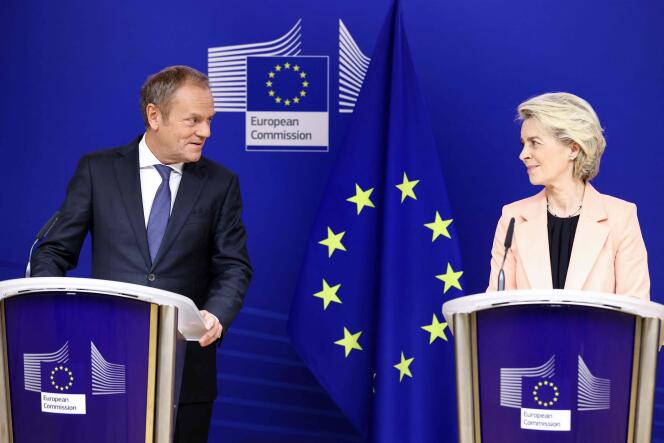


The visit was as much symbolic as it was dictated by a sense of urgency. On Wednesday, October 25, former Polish Prime Minister Donald Tusk, who was assured of a return to the post after the democratic opposition's spectacular victory in the parliamentary elections 10 days earlier, visited Brussels. Tusk, who was also the president of the European Council from 2014 to 2019, met European Commission President Ursula von der Leyen in his capacity as the opposition leader for some time to come.
This was, therefore, an "informal" meeting that did not take the form of one: the two leaders, all smiles, made a joint press statement, an exercise that von der Leyen had hitherto avoided with the outgoing prime minister, the very Europhobic Mateusz Morawiecki. "Poles have been waiting for this moment for eight long years," said Tusk. "I'm here to speed up the process of Poland's return to full membership in the European Union. We are returning to this path because this is the will of the Polish voters." Von der Leyen declared herself delighted that "the record turnout at the elections [74.4 %] has shown, once again, that Poles are strongly committed to democracy."
However, the main objective of Tusk's visit was very concrete: convincing the European Commission to give his country more time to meet the criteria required to release funds from the European recovery plan, which have been frozen for two years due to the outgoing ultraconservative government's refusal to comply with the rules governing the rule of law. For Warsaw, time is of the essence: Poland could be deprived of almost €34 billion due to legal delays. However, the introduction of any legislative changes requires the signature of the president, Andrzej Duda, and leaves the opposition hanging on the threat of his veto – hence Tusk's request for more "flexibility" on the part of European institutions.
This situation is indicative of the countless difficulties that lie ahead for the democratic opposition, foremost of which is the coalition with Duda (a member of the losing Law and Justice party (PiS), which had been in power since 2015), at least until the presidential election in spring 2025. Until then, all legislative initiatives, apart from the budget vote, require the president's signature before they can be passed. This means that the new majority will have very little room for maneuver. Will the president return to the logic of all-out confrontation with his former political enemies, or will he adopt a more conciliatory stance in light of the election results? This question currently dominates Polish public life.
You have 60% of this article left to read. The rest is for subscribers only.
